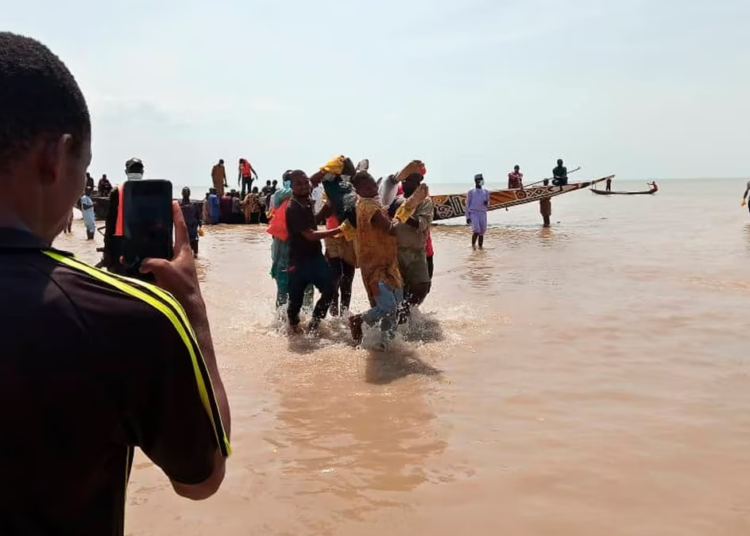The inland waterway is regarded as the alternative to road transportation as it is devoid of traffic congestion and cheaper and faster to connect various destinations.
According to statistics, Nigeria has over 10,000km of inland waterways, but only 3,000 are currently navigable. This makes Nigeria less attractive to riverine communities because navigable routes are insignificant in attracting patronage compared to non-navigable routes.
Aside from being unnavigable, incessant boat mishaps have made the nation’s inland waterway unattractive to passengers and Nigerians, who are expected to see it as an alternative to chaotic land transport.
In addition to ferrying passengers, inland waterways can move cargo consignments from seaports to warehouses. Experts have argued that moving cargo through inland waterways is the most reliable, efficient, safe, and cost-effective mode of transportation.
For instance, cargoes can be moved from the Lagos seaport to Onitsha, Baro, Oguta, and Lokoja, among others, thereby expanding the life span of the roads across the country and reducing the cost of haulage. Still, the non-navigability of the waterways has made a move practically unachievable.
Having identified the challenges bedevilling the nation’s Inland Waterways, the National Inland Waterways Authority (NIWA) said it has put machinery in place to change the narratives. Under the management of the managing director, Bola Oyebamiji, the agency first commissioned 15 boats of varying capacities and purposes designed to enhance surveillance, safety enforcement, and emergency response on the inland waterways.
The commissioned fleet comprises three surveillance boats, five safety enforcement boats, a gun patrol boat, a 62-seater passenger boat as a pilot scheme to replace traditional wooden canoes, three water ambulances, and two hydrographic survey boats equipped with multi-beam echo sounders.
During the commissioning, the minister of Marine and Blue Economy, Gboyega Oyetola, stated that the Ministry is determined to maximise the comparative advantages of the nation’s maritime resources in line with President Bola Tinubu’s Renewed Hope Agenda. He said, “These initiatives fulfil our commitment to ensuring our inland waterways are well-utilised for cargo shipment and passenger transportation.”
In addition to commissioning boats, the authority also launched the Inland Waterways Transportation Regulations 2023, otherwise known as the Waterways Transportation Code. The Code was expected to significantly standardise water transportation, minimise accidents, and provide a structured environment for potential investors.
Speaking on the importance of the inland Waterways Transportation Code and ending accidents on the waterway, the NIWA MD said, “After receiving my appointment letter, the minister of Marine and Blue Economy charged me to find a lasting solution to incessant accidents on the Waterways. In response to that charge, my team and I have already implemented measures to address that situation. The first thing we did was to ensure that the Inland Waterways Transportation Regulation (2023) for safety regulations on the inland waterways was gazetted. Establishing the Code gazetted has been ongoing for many years; however, we have concluded the process within six months, and the Minister of Marine and Blue Economy has launched the Code.’’
Experts have commended the efforts of the National Inland Waterways Authority (NIWA) to enhance water transportation in Nigeria, but they urge federal and state governments to harness its potential fully. They argue that a well-managed inland waterway system could enable seamless travel from Lagos to distant states like Taraba, making transporting goods more accessible and cost-effective. This would reduce road accidents and extend the lifespan of highways.
According to transportation expert, Bolaji Samuel, Nigeria’s vast waterways could solve the challenges posed by removing fuel subsidies. If properly developed, water transportation could become a lucrative revenue source for federal and state governments. He also highlighted the need for investment in infrastructure, such as modern jetties, boats, and terminals, to ensure safe, efficient, and affordable operations.
He noted that many major cities, such as Lagos and Port Harcourt, are situated along waterways. However, he lamented that the rise of road, rail, and air transport has diminished the focus on water transportation.
Another expert, an investor in water transportation in Port Harcourt, Rivers State, James Okoh, said that rising fuel costs, the difficulty of maintaining road vehicles, and the environmental impact of road transport make it necessary to reconsider water transportation. However, he stressed that inadequate infrastructure and safety concerns deter people from using it.
He urged the development of jetties, the standardisation of ferry boats, and the implementation of safety measures, including radar systems to navigate obstacles in the water. He also highlighted the need for better lighting for night travel and public education to encourage more people to use water transport. He says water travel is faster, healthier, and more cost-effective.





